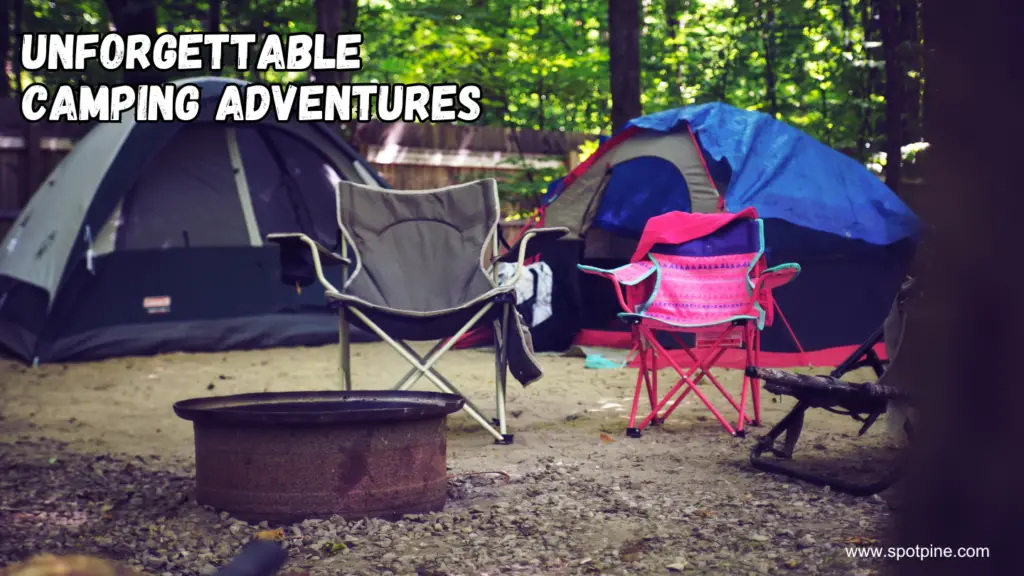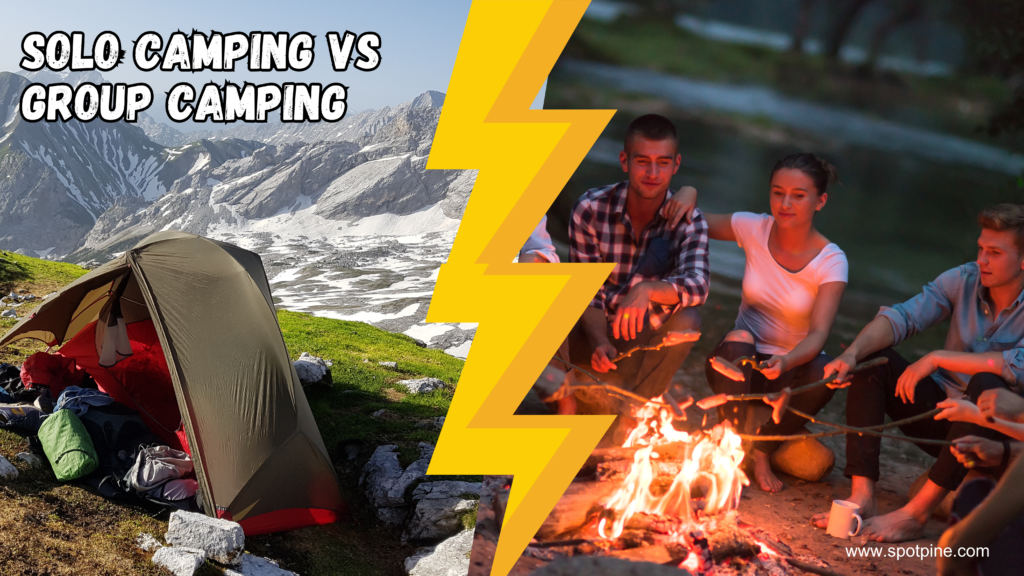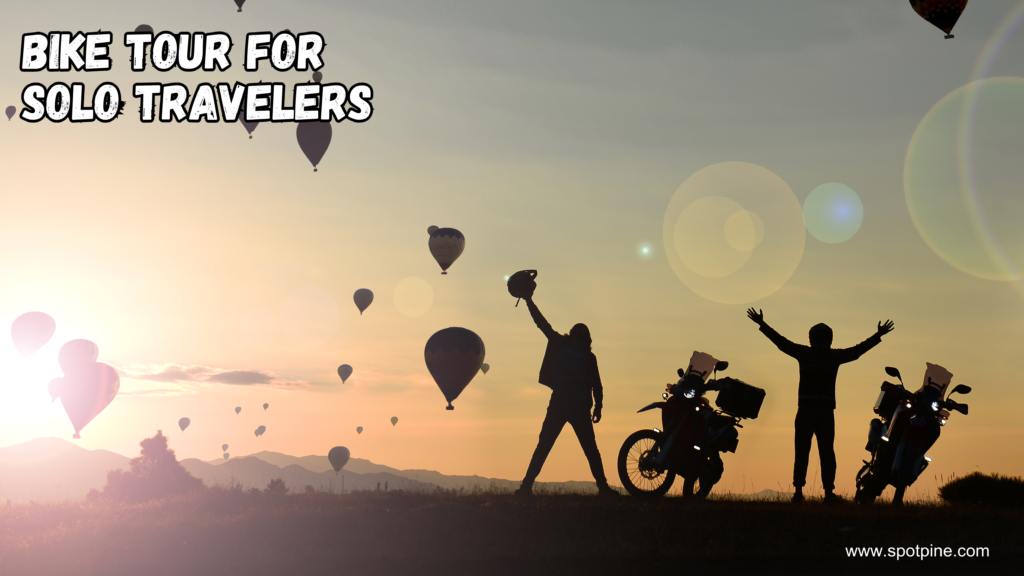Create memories that last a lifetime with friends and family while camping in the great outdoors. Enjoying the simplicity of nature and gathering around the campfire, cooking great meals and treats is an experience to treasure.
Camping is more than just a getaway; it’s an opportunity to create lasting memories with loved ones. The smell of the campfire, the sound of laughter, and the sight of starry nights all contribute to a unique bonding experience. Whether it’s telling stories, exploring the surroundings, or simply enjoying the outdoors, camping provides a chance to disconnect from the hustle and bustle of everyday life.
The memories made during these trips will be cherished for years to come, serving as a reminder of the simple joys life has to offer.
Choosing The Perfect Campsite
Embark on unforgettable camping memories by carefully selecting the perfect campsite. Create lasting experiences with loved ones amidst nature’s beauty and the warmth of a crackling campfire. Choose your spot wisely for moments that will stay etched in your heart forever.
Location:
Choosing the perfect campsite starts with considering the location. Look for campsites that are easily accessible and not too far from your home or the nearest town. This will save you time and energy during the trip and ensure that you have everything you need within reach. Additionally, consider the surroundings of the campsite. Do you prefer a campground nestled in the woods, offering a serene and peaceful atmosphere? Or perhaps you’d like a site overlooking a lake or river, providing breathtaking views and opportunities for water activities. Whatever your preference, make sure the location aligns with the type of camping experience you desire.
Campsite Facilities:
When choosing a campsite, it’s important to consider the facilities available. This includes amenities such as clean restrooms, showers, and potable water. Having these facilities on-site can make your camping experience much more comfortable and convenient. Additionally, check if there are picnic tables, fire pits, and grills available for your use. These amenities will allow you to cook delicious meals and enjoy outdoor dining with your family and friends. If you’re camping with children, look for campsites that offer playgrounds or recreational areas to keep them entertained throughout the trip.
Nearby Attractions:
Another factor to consider when choosing a campsite is the proximity to nearby attractions. Do you want to explore hiking trails, go fishing, or engage in other outdoor activities? Look for campsites that are close to national parks, lakes, or rivers. This will allow you to easily access these attractions and make the most out of your camping trip. Additionally, consider if there are any local attractions or landmarks that you’d like to visit during your stay. Research the area and see if there are any museums, historical sites, or events that align with your interests. Having nearby attractions will provide you with opportunities to create lasting memories and make your camping experience truly unforgettable. In conclusion, choosing the perfect campsite involves considering the location, campsite facilities, and nearby attractions. By taking these factors into account, you can ensure that your camping trip is enjoyable, convenient, and filled with memorable experiences. So start planning your next camping adventure and get ready for memories to last a lifetime.
Essential Camping Gear
When it comes to creating unforgettable camping memories, having the right gear is essential. From shelter and sleep to nourishment and safety, the right equipment can make or break a camping experience. Here’s a breakdown of the essential camping gear you need to ensure a comfortable and enjoyable trip.
Tents And Sleeping Bags
Tents and sleeping bags are the foundation of any camping trip, providing shelter and comfort. When selecting a tent, consider the size of your group and the weather conditions. Opt for a durable, waterproof tent that can withstand various elements. Similarly, choosing the right sleeping bag is crucial for a good night’s rest. Look for insulation and comfort features that suit the climate of your camping destination.
Camp Cooking Equipment
Having the right camp cooking equipment ensures that meal preparation is convenient and enjoyable. A portable stove or grill, cookware, and utensils enable you to create delicious meals while camping. Make sure to pack a cooler for storing perishable items and consider quick and easy cooking options, such as campfire cooking, for a rustic experience.
Outdoor Survival Tools
Outdoor survival tools are essential for ensuring safety and security during a camping trip. First aid kits, multi-tools, and fire starters are invaluable in emergency situations. Additionally, navigation equipment, such as maps and compasses, can prevent getting lost in unfamiliar territory. Don’t forget to pack flashlights and batteries for illuminating the night and enhancing safety.
Planning Fun Activities
When camping, planning fun activities is essential to create lasting memories. Engaging in exciting outdoor adventures brings families closer and fosters a love for nature. Let’s explore some exhilarating activities to make your camping trip unforgettable.
Hiking And Nature Exploration
Exploring the great outdoors through hiking trails and nature walks is a fantastic way to connect with nature. Witnessing breathtaking landscapes and encountering wildlife adds thrill and excitement to the camping experience.
Campfire Cooking And S’mores
One of the highlights of camping is gathering around a campfire to cook delicious meals and roast marshmallows for S’mores. The warmth of the fire and the aroma of food create a cozy atmosphere for bonding with loved ones.
Water Sports And Swimming
Engaging in water sports like kayaking, paddleboarding, or canoeing brings a sense of adventure to your camping trip. Cooling off with a refreshing swim in a natural lake or river provides a fun way to beat the summer heat.
Capturing Memories
While camping, we experience unforgettable moments that should last a lifetime. Here are some ways to capture and cherish these adventures.
Keeping A Camping Journal
One of the best ways to preserve camping memories is by keeping a camping journal. Document your experiences, sights, and feelings in the peace and tranquility of nature. This journal will be a treasure trove of memories to look back on in years to come.
Photography Tips And Tricks
Use your camera to capture the breathtaking landscapes, beautiful sunsets, and the joy in the faces of your fellow campers. Experiment with different angles and settings to get the perfect shots to reminisce about your camping trips.
Record Special Moments
Take the time to record special moments like roasting marshmallows, stargazing, and hiking adventures. These moments may seem ordinary but will be cherished memories that you will delight in reliving through your photographs and stories.
Creating Lasting Bonds
Create unforgettable and lasting bonds with camping memories to last a lifetime. Cherish moments shared by the campfire, indulging in outdoor activities, and creating lasting connections with nature and loved ones. Cherish these treasured days and stories made under the open sky.
Family Camping
Spending quality time together in the great outdoors strengthens familial ties and creates lasting memories.
Friends Camping Trip
Exploring nature with friends fosters camaraderie and shared experiences that bond friendships for a lifetime.
Group Activities And Games
Engaging in group activities and games during camping promotes teamwork, communication, and fun memories.
Overcoming Challenges
When it comes to creating camping memories to last a lifetime, it’s not always smooth sailing. Camping often presents us with challenges – from unpredictable weather to unforeseen setbacks. However, it’s in these moments of overcoming challenges that we truly learn and grow. In this blog post, we’ll explore some common challenges campers face and share tips on how to handle them with grace and ease.
Dealing With Bad Weather
One of the most common challenges campers face is bad weather. While we can’t control Mother Nature, we can certainly prepare for her unpredictable moods. Here are some tips to help you navigate through rain, storms, or extreme temperatures:
- Check the weather forecast before you embark on your camping trip. This will give you an idea of what to expect and allow you to pack accordingly.
- Invest in good quality waterproof gear such as raincoats, waterproof tents, and tarps. These will help keep you dry and comfortable during wet weather.
- Plan indoor activities or games that can be enjoyed inside your tent or campervan during bad weather. This will ensure that the fun doesn’t stop, even if you’re confined indoors.
- Embrace the beauty of nature in all its forms, including rain and storms. Take the opportunity to capture breathtaking photographs or simply enjoy the calming sound of raindrops on your tent.
Managing Campsite Setbacks
Another challenge that campers often encounter is unexpected setbacks at the campsite. Whether it’s a faulty tent zipper or a missing camping accessory, these setbacks can dampen the camping experience. Here are some tips to help you manage campsite setbacks effectively:
- Come prepared with a well-stocked camping toolkit that includes essential tools such as a multi-tool, duct tape, and extra tent pegs. This will allow you to quickly fix any minor issues that may arise.
- Be open to improvising and finding creative solutions. For example, if your camping chair breaks, use a log or a sturdy stump as a makeshift seat.
- Reach out to fellow campers or campground staff for assistance. They may have the necessary resources or knowledge to help you overcome the setback.
- Stay calm and maintain a positive mindset. Remember, setbacks are part of the adventure and can even become cherished memories in the future.
Handling Outdoor Safety Issues
Outdoor safety is of utmost importance when camping. While it’s essential to embrace the thrill of nature, it’s equally important to prioritize your safety. Here are some tips to help you handle outdoor safety issues:
- Research and familiarize yourself with the local wildlife and potential hazards in the camping area. This will enable you to take necessary precautions and prevent any unpleasant encounters.
- Carry a well-stocked first aid kit that includes essentials such as bandages, antiseptic wipes, and insect repellent. Accidents happen, and being prepared can make a big difference.
- Follow campground rules and guidelines. They are put in place for your safety and the preservation of the natural environment.
- Stay informed about weather conditions and any potential natural disasters in the area. If necessary, evacuate to a safe location and prioritize your well-being.
In conclusion, challenges are inevitable when it comes to camping, but they provide valuable opportunities for growth and resilience. By preparing for bad weather, managing campsite setbacks, and prioritizing outdoor safety, you can overcome these challenges and create camping memories that will last a lifetime.
Preserving The Environment
When it comes to camping, preserving the environment is of utmost importance. As outdoor enthusiasts, it is our responsibility to leave nature as we found it, if not better. By following specific principles and practices, we can ensure that our camping memories last a lifetime while leaving a positive impact on the environment.
Leave No Trace Principles
The Leave No Trace principles are guidelines that help campers minimize their impact on nature. By following these principles, we can preserve the environment for future generations of campers:
- Plan Ahead and Prepare: Proper planning ensures that we are well-prepared for our camping trip, reducing the need to alter the natural surroundings.
- Travel and Camp on Durable Surfaces: Setting up our campsites on established areas such as designated camping spots helps protect vegetation.
- Dispose of Waste Properly: Proper waste disposal ensures that no trace of our presence is left behind. Always pack out what you pack in.
- Leave What You Find: It is important not to disturb natural features, cultural artifacts, or plants and animals.
- Minimize Campfire Impacts: Responsible campfire practices not only prevent wildfires but also minimize the impact on the surrounding environment.
- Respect Wildlife: Observing animals from a distance and avoiding feeding or disturbing them helps maintain their natural behavior.
- Be Considerate of Other Visitors: Being mindful of other campers ensures a harmonious experience for everyone.
Responsible Campfire Practices
One of the highlights of camping is gathering around the campfire. However, it is essential to practice responsible campfire practices to minimize our impact on the environment:
- Choose existing fire rings or fire pits, if available.
- If building a new fire pit, select a location away from vegetation, rocks, and overhanging branches.
- Use only dead and downed wood for your fire.
- Never leave a campfire unattended and always fully extinguish it before leaving.
- Avoid leaving behind any trash or food scraps in the fire pit.
Proper Waste Disposal
Proper waste disposal is crucial to maintaining the cleanliness of our campsite and minimizing our impact on the environment:
| Recyclable Waste | Non-Recyclable Waste | Organic Waste |
| Separate recyclable items such as plastic bottles, aluminum cans, and glass jars. | Dispose of non-recyclable waste in designated trash bins. | Dispose of organic waste in a proper composting area or bury it away from water sources. |
By adhering to these waste disposal practices, we can keep our camping areas clean and protect the local flora and fauna.
Credit: www.amazon.com
Creating camping memories to last a lifetime is a priceless experience that brings people closer to nature and each other. The joy of running and playing, storytelling by the campfire, and delicious outdoor meals add a special touch to these treasured days.
These moments of togetherness create memories that endure long after the campfire has burned out.



